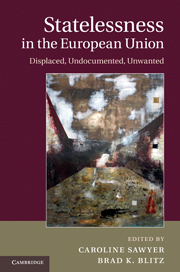Book contents
- Frontmatter
- Contents
- List of contributors
- List of cases
- List of conventions, covenants and treaties
- Acknowledgements
- List of abbreviations and acronyms
- PART I The issue
- PART II The research project
- 6 Research design and methodology of the country studies
- 7 De facto statelessness in the United Kingdom
- 8 Non-citizens in Slovenia: erasure from the register of permanent residents
- 9 The statelessness issue in Estonia
- 10 The sans papiers in France
- 11 Analysis: the practical and legal realities of statelessness in the European Union
- 12 Conclusions
- Bibliography
- Index
9 - The statelessness issue in Estonia
from PART II - The research project
Published online by Cambridge University Press: 17 February 2011
- Frontmatter
- Contents
- List of contributors
- List of cases
- List of conventions, covenants and treaties
- Acknowledgements
- List of abbreviations and acronyms
- PART I The issue
- PART II The research project
- 6 Research design and methodology of the country studies
- 7 De facto statelessness in the United Kingdom
- 8 Non-citizens in Slovenia: erasure from the register of permanent residents
- 9 The statelessness issue in Estonia
- 10 The sans papiers in France
- 11 Analysis: the practical and legal realities of statelessness in the European Union
- 12 Conclusions
- Bibliography
- Index
Summary
The issue of statelessness has a very specific face in Estonia, where de jure statelessness is relatively common. Citizenship is itself a complex phenomenon, in which the relationship between the de jure and de facto aspects can take different forms. Soysal, for example, claims, that in the era of post-national membership in Europe, rights are no longer dependent on de jure citizenship, but on supra-national institutions, which emphasise the universality of rights, as opposed to their national character. Hammar, on the other hand, claims that in modern states a large proportion of aliens is emerging, with no interest or opportunity to acquire citizenship. These people are the so-called ‘denizens’, to whom rather broad-scale rights and social benefits extend. Thus, they cannot be regarded regular aliens; nor, however, are they naturalized citizens. Estonia represents an example of a state where a large number of long-term permanent residents do not own Estonian citizenship de jure, but whose social rights (de facto citizenship) do not differ remarkably from those of the Estonian citizens. However, this is not an example of a post-national condition described by Soysal, but that of a post-communist one, where the issue of massive denizenship has a specific history and meaning. The goal of this chapter is, first, to discuss the formation and dynamics of massive statelessness in Estonia after the country regained independence in 1991; second, to outline the main aspects of the legal status of the stateless non-citizens as compared to the Estonian citizens; and, third, to report the results of several interview projects carried out by the author on how the non-citizens perceive their statelessness and how they manage in the Estonian labour market, educational system and other areas of everyday life.
- Type
- Chapter
- Information
- Statelessness in the European UnionDisplaced, Undocumented, Unwanted, pp. 230 - 252Publisher: Cambridge University PressPrint publication year: 2011
- 3
- Cited by



